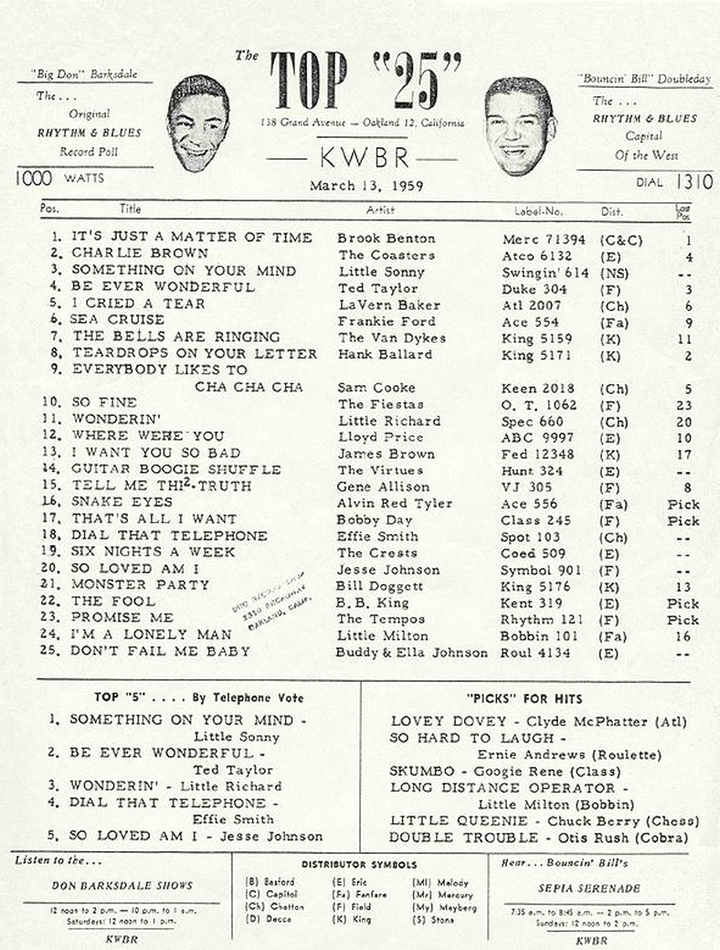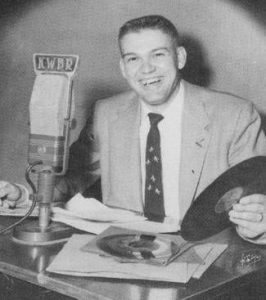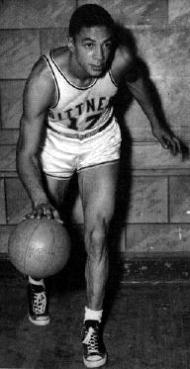KWBR 1310, Oakland
The Top “25” Survey
March 13, 1959

Oakland’s KWBR didn’t start out primarily serving the Eastbay’s black radio audience, but the station’s 1310 position on the AM dial became a popular spot to tune in during the late 1940s through the 1950s. KWBR touted itself then as “The Rhythm and Blues Capital of the West.”

By the end of the 1950s, KWBR boasted two of the Bay Area’s favorite rhythm and blues disc jockeys, “Big Don” Barksdale and John William “Bouncin’ Bill” Doubleday. As shown on this March 1959 music survey, Barksdale hosted two shows every weekday (noon to 2 p.m. and 10 p.m. to 1 a.m.), as well as Saturdays from noon to 1 p.m., while Doubleday hosted Sepia Serenade from 7:35 to 8:45 a.m. and 2 to 5 p.m. on weekdays, and from noon to 2 p.m. on Sundays.
Both Barksdale (2007) and Doubleday (2011) were inducted into the Bay Area Radio Hall of Fame.
Oakland-born Don Angelo Barksdale, a 1941 graduate of Berkeley High School (where he was not permitted to play on the all-white varsity basketball team), went on to become a star basketball player at the College of Marin as a 6’6″ center, leading the school to the California Junior College Championship in both 1942 and 1943.

He transferred to UCLA on a basketball scholarship in the Fall of 1943 before entering military service. Following World War II, Barksdale returned to UCLA and led the Bruins to the Pacific Coast Conference championship in 1946-47. That season, he became the first African-American to be named to the NCAA All-America team. While at UCLA, he opened his first business venture, a record shop.
Unable to play pro basketball due to an NBA rule prohibiting black players, he returned to the East Bay and played amateur hoops for the Oakland Bittners, leading the team to the 1947 AAU championship game, which they lost to the powerhouse Phillips 66ers. Two years later, Barksdale and the Bittners defeated the 66ers for the AAU crown, ending the Oklahoma team’s run of six consecutive amateur titles.
Despite being kept out of the NBA, Barksdale was recruited to play for the U.S. Olympic basketball team in 1948, becoming the first black player on the squad — and the first to earn a gold medal — averaging nine points per game. Finally, Barksdale was permitted to enter the NBA in 1951 as a 28-year-old rookie with the Baltimore Bullets. In 1953, with the Boston Celtics, he became the first black player to be selected to play in the NBA All-Star Game. He retired from the game after the 1955 season.
Barksdale is widely noted as the first black disc jockey on Bay Area radio, appearing on the Oakland Tribune’s KLX (910 kc.) in 1948, before moving across town to KROW (960 kc.) with the nightly “Harlem Holiday” beginning in 1949. In 1950, he also began hosting “Sepia Review” on KRON-TV (Channel 4).
As a business entrepreneur, Barksdale established an advertising agency and a beer distributorship (Blue & Gold Beer, the first black-owned enterprise of its kind in the Bay Area), a record label (Rhythm Records) and two popular Oakland nightspots, The Sportsman and The Showcase.
Moving to KWBR in 1955, Barksdale helped build the station’s popularity among black listeners, which helped to attract the interest of Sonderling Broadcasting, owner of WDIA in Memphis, Tenn. In July 1959, four months after this survey was published, KWBR was sold by the estate of station co-founder Stafford Warner to Sonderling, which converted the station to KDIA on September 4, 1959.
Barksdale died in 1993, by which time his Save High School Sports Foundation had raised over a million dollars to assist under-funded inner-city sports programs in San Francisco and Oakland.
Related Exhibits:
SOURCE: Survey image from the David Billeci Collection of the Bay Area Radio Museum; additional historical information from Athletes United For Peace, the Naismith Memorial Basketball Hall of Fame, the Pacific-10 Conference and the African American-Ethnic Sports Hall of Fame.
![]()
